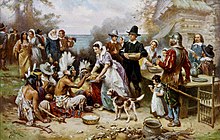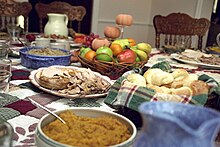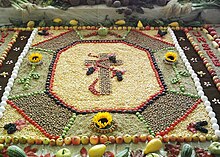Thanksgiving
Jump to navigation
Jump to search

Thanksgiving Day is a harvest festival celebrated primarily in Canada and the United States. Traditionally, it is a time to give thanks for the harvest and express gratitude in general. While religious in origin, Thanksgiving is now celebrated by religious and secular people alike.
In the United States Thanksgiving is celebrated in November[1], In Canada it is celebrated on the second Monday in October.
Quotes[edit]
- Alphabetized by author

- This kind of isolation is one of the unspoken tragedies of the elderly, who are now being told 'don’t see your family at Thanksgiving' . For many people, this is their final Thanksgiving believe it or not."
- Dr w:Scott Atlas, member of the White house Coronavirus taskforce, in Trump adviser Scott Atlas criticizes plans to avoid seeing elderly for Thanksgiving [https://thehill.com/policy/healthcare/526332-trump-adviser-scott-atlas-criticizes-plans-to-avoid-seeing-elderly-for published November 17, 2020
- In 1863, Abraham Lincoln declared two Thanksgivings. One was held in August. The second, held in November, was to give thanks for the nation's blessings. This fall celebration caught on and has been a tradition ever since.
- Linda Bozzo in: Corny Thanksgiving Jokes to Tickle Your Funny Bone, Enslow Publishers, Inc., 1 January 2013, p. 18
- Thanksgiving is a time for families and friends to gather together and express gratitude for all that we have been given, the freedoms we enjoy, and the loved ones who enrich our lives. We recognize that all of these blessings, and life itself, come not from the hand of man but from Almighty God.
- George W. Bush, Thanksgiving Day Proclamation (21 November 2008)
- Thanksgiving provides a formal context in which to consider the instances of kindness that have enlightened our lives, for moments of grace that have gotten us through when all seemed lost. These are fine and sentimental subjects for contemplation.
- Jon Carroll, San Francisco Chronicle [1] (24 November 2005)
- We have come far on our American journey since that early Thanksgiving. In the intervening years, we have lived through times of war and peace, years of poverty and plenty, and seasons of social and political upheaval that have shaped and forever changed our national character and experience. As we gather around our Thanksgiving tables again this year, it is a fitting time to reflect on how the events of our rich history have affected those we care about and those who came before us. As we acknowledge the past, we do so knowing that the individual blessings for which we give thanks may have changed, but our gratitude to God and our commitment to our fellow Americans remain constant.
- Bill Clinton, Thanksgiving Day Proclamation (25 November 1999)
- Why celebrate Columbus? It was the onset of colonialism, the slave trade and dispossession of the Native people of the Americas. So, that is celebrated with a federal holiday. That’s followed then by Thanksgiving, which is a completely made-up story to say the Native people welcomed these people who were going to devastate their civilizations, which is simply a lie. And then you go to Presidents’ Days, the Founding Fathers, in February, and celebrate these slaveowners, Indian killers. George Washington headed the Virginia militia for the very purpose of killing Native people on the periphery of the colony, before, you know, when it was still a Virginia colony. And then we have the big day, the fireworks, July 4th, independence, which is probably the most tragic event in world history, because it gave us—it gave the world a genocidal regime under the guise of democracy. And that’s really the—I’m a historian, so that’s the historical context that I think we have to see Thanksgiving in, that it is a part of that mythology that attempts to cover up the real history of the United States.
- Roxanne Dunbar-Ortiz Interview with Democracy Now (2016)
- Thanksgiving is the quintessential origin story a settler nation tells itself: "peace" was achieved between Natives and settlers at Plymouth, Massachusetts, where Mayflower pilgrims established a colony in 1620, over roast turkey and yams. To consummate the wanton slaughter of some 700 Pequots, in 1637 the governor of the Massachusetts Bay Colony, William Bradford, proclaimed that Thanksgiving Day be celebrated "in honor of the bloody victory, thanking God that the battle had been won." Peace on stolen land is borne of genocide.
- Nick Estes Our History Is the Future: Standing Rock Versus the Dakota Access Pipeline, and the Long Tradition of Indigenous Resistance (2019)
- the first Thanksgiving story is — begins with the Pequot massacre by members of the Massachusetts Bay Colony, which really marks sort of — in my opinion, marks sort of the mythology of the United States as a settler-colonial country founded on sort of genocide to create, ironically, peace.
- Nick Estes Interview with Democracy Now (November 2022)
- You may have heard of Black Friday and Cyber Monday. There's another day you might want to know about: Giving Tuesday. The idea is pretty straightforward. On the Tuesday after Thanksgiving, shoppers take a break from their gift-buying and donate what they can to charity.
- Bill Gates in: Shaun Green Inside the Mind of Bill Gates, Shaun Green, 22 September 2014, p. 35
- [Thanksgiving is] my favorite holiday, I think. It's without a doubt my favorite American Holiday. I love Christmastime, Chanuka etc. But Thanksgiving is as close as we get to a nationalist holiday in America (a country where nationalism as a concept doesn't really fit). Thanksgiving's roots are pre-founding, which means its not a political holiday in any conventional sense. We are giving thanks for the soil, the land, for the gifts of providence which were bequeathed to us long before we figured out our political system. Moreover, because there are no gifts, the holiday isn't nearly so vulnerable to materialism and commercialism. It's about things -- primarily family and private accomplishments and blessings -- that don't overlap very much with politics of any kind. We are thankful for the truly important things: our children and their health, for our friends, for the things which make life rich and joyful. As for all the stuff about killing Indians and whatnot, I can certainly understand why Indians might have some ambivalence about the holiday (though I suspect many do not). The sad -- and fortunate -- truth is that the European conquest of North America was an unremarkable old world event (one tribe defeating another tribe and taking their land; happened all the time) which ushered in a gloriously hopeful new age for humanity. America remains the last best hope for mankind. Still, I think it would be silly to deny how America came to be, but the truth makes me no less grateful that America did come to be. Also, I really, really like the food.
- Jonah Goldberg, The Corner on National Review (24 November 2004)
- Lord, for the erring thought
Not into evil wrought:
Lord, for the wicked will
Betrayed and baffled still:
For the heart from itself kept,
Our thanksgiving accept.- William Dean Howells, A Thanksgiving

- Population has steadily increased, notwithstanding the waste that has been made in the camp, the siege and the battle-field; and the country, rejoicing in the consciousness of augmented strength and vigor, is permitted to expect continuance of years with large increase of freedom. No human counsel hath devised nor hath any mortal hand worked out these great things. They are the gracious gifts of the Most High God, who, while dealing with us in anger for our sins, hath nevertheless remembered mercy. It has seemed to me fit and proper that they should be solemnly, reverently and gratefully acknowledged as with one heart and one voice by the whole American People. I do therefore invite my fellow citizens in every part of the United States, and also those who are at sea and those who are sojourning in foreign lands, to set apart and observe the last Thursday of November next, as a day of Thanksgiving and Praise to our beneficent Father who dwelleth in the Heavens.
- Abraham Lincoln in: Thanksgiving Day Proclamation (3 October 1863)
- Thanksgiving is not an anachronism whose time is past. It is much more than a holiday to celebrate a meal shared between the Pilgrims and Native Americans. It is a time to reflect and be thankful for what we have--not for what we cherish, desire or envy.
- Ted Nugent, America Rocks (28 November 2002)
- During the "first Thanksgiving" at Plymouth, Wampanoag Indians - including a Patuxet Indian named Squanto - helped teach Pilgrims how to farm, fish, and hunt and shared the bounty of that first feast. A tradition that continues today and Jesus and 9/11.
- Patton Oswalt in: Zombie Spaceship Wasteland: A Book by Patton Oswalt, Simon and Schuster, 4 January 2011, p. 116

Patient of labor when the end was rest,
Indulged the day that housed their annual grain,
With feasts, and off'rings, and a thankful strain. - Alexander Pope.
- Our rural ancestors, with little blest,
Patient of labor when the end was rest,
Indulged the day that housed their annual grain,
With feasts, and off'rings, and a thankful strain.- Alexander Pope in: Vicesimus Knox Elegant Extracts: Or, Useful and Entertaining Passages, from the Best English Authors and Translations, Volume 5, Benjamin B. Mussey, 1842, p. 160
- Thanksgiving has become a day when Americans extend a helping hand to the less fortunate. Long before there was a government welfare program, this spirit of voluntary giving was ingrained in the American character. Americans have always understand that, truly, one must give in order to receive. This should be a day of giving as well as a day of thanks...Let us recommit ourselves to that devotion to God and family that has played such an important role in making this a great Nation, and which will be needed as a source of strength if we are to remain a great people.
- Ronald Reagan, Thanksgiving Day Proclamation' (12 November 1981)
- Marcie: Don't feel bad, Chuck. Peppermint Patty didn't mean all those things she said. Actually, she really likes you.
Charlie Brown: I don't feel bad for myself, I just feel bad because I've ruined everyone's Thanksgiving.
Marcie: But Thanksgiving is more than eating, Chuck. You heard what Linus was saying out there. Those early Pilgrims were thankful for what had happened to them, and we should be thankful, too. We should just be thankful for being together. I think that's what they mean by 'Thanksgiving,' Charlie Brown.- Charles Schulz, in A Charlie Brown Thanksgiving, originally aired in 1973
- The Christian who walks with the Lord and keeps constant communion with Him will see many reason for rejoicing and thanksgiving all day long.
- Finis Steelman in: Sermon Messages from God's Man, Finis Steelman, iUniverse, 30 November 2006, p. 176
- Shall we not have reason to conclude, that other planets besides our own are inhabited by living creatures? All the planets resemble our earth; like it enjoy the light and genial warmth of the sun, have the alternation of night and day, and the succession of summer and winter: but what end would all these phenomena answer unless the planets were inhabited? Considering them as so many peopled worlds, what a sublime idea we conceive of the grandeur of God, and the extent of his empire! How impossible to fathom his bounty, or penetrate the limits of his power! His glory, reflected from so many worlds, tills us with amaze, and calls forth every sentiment of awe, veneration and gratitude. Supposing that his praise is celebrated in all the worlds which roll above and round us, let us not be surpassed in our adoration, but in holy emulation mingle our hymns with those of the inhabitants of these numerous worlds, and celebrate the Lord God of the universe with eternal thanksgiving!|
- Christoph Christian Sturm in March XXX, of Reflections on the works of God, as translated by Robert Balfour (1810), p. 167
- I am grateful for what I am & have. My thanksgiving is perpetual. It is surprising how contented one can be with nothing definite — only a sense of existence. Well, anything for variety. I am ready to try this for the next 1000 years, & exhaust it. How sweet to think of! My extremities well charred, and my intellectual part too, so that there is no danger of worm or rot for a long while. My breath is sweet to me. O how I laugh when I think of my vague indefinite riches. No run on my bank can drain it — for my wealth is not possession but enjoyment.
- Henry David Thoreau, in a letter to Harrison Gray Otis Blake (6&7 December 1856), as published in The Correspondence of Henry David Thoreau (1958), p. 444; also published in Letters to Various Persons (1865), p. 145, but with a line within this appearing in what has become its most quoted form as "I am ready to try this for the next ten thousand years, and exhaust it."
- I encourage all Americans to gather, in homes and places of worship, to offer a prayer of thanks to God for our many blessings.
- President Donald Trump in PRESIDENT ENCOURAGES THANKSGIVING GATHERINGS... SCOTUS Paves The Way published on American thanksgiving day, 2020
- Thanksgiving Day, a function which originated in New England two or three centuries ago when those people recognized that they really had something to be thankful for -- annually, not oftener -- if they had succeeded in exterminating their neighbors, the Indians, during the previous twelve months instead of getting exterminated by their neighbors, the Indians. Thanksgiving Day became a habit, for the reason that in the course of time, as the years drifted on, it was perceived that the exterminating had ceased to be mutual and was all on the white man's side, consequently on the Lord's side; hence it was proper to thank the Lord for it and extend the usual annual compliments.”
- Mark Twain, in Mark Twain's Autobiography, Kartindo.com, p. 258
- In the original language, "he gave thanks" reads "eucharisteo." . . . The root word for eucharisteo is 'charis', meaning "grace." Jesus took bread and saw it as grace and gave thanks. He took the bread and knew it to be gift and gave thanks.”
- Ann Voskamp in: Jessica Wrobleski The Limits of Hospitality, Liturgical Press, 1 January 2012, p. 94
- WHEREAS it is the duty of all nations to acknowledge the providence of Almighty God, to obey His will, to be grateful for His benefits, and humbly to implore His protection and favour; and Whereas both Houses of Congress have, by their joint committee, requested me "to recommend to the people of the United States a DAY OF PUBLICK THANKSGIVING and PRAYER, to be observed by acknowledging with grateful hearts the many and signal favors of Almighty God, especially by affording them an opportunity peaceably to establish a form of government for their safety and happiness."
- George Washington, The First Presidential Thanksgiving Day Proclamation (3 October 1789)
Hoyt's New Cyclopedia Of Practical Quotations (1922)[edit]
Quotes reported in Hoyt's New Cyclopedia Of Practical Quotations (1922), p. 785-786.
- Thanksgiving-day, I fear,
If one the solemn truth must touch,
Is celebrated, not so much
To thank the Lord for blessings o'er,
As for the sake of getting more!- Will Carleton, Captain Young's Thanksgiving
- And taught by thee the Church prolongs
Her hymns of high thanksgiving still.- John Keble, The Christian Year; St. Luke the Evangelist, St. 18
- Great as the preparations were for the dinner, everything was so contrived that not a soul in the house should be kept from the morning service of Thanksgiving in the church.
- Harriet Beecher Stowe, Oldtown Folks, p. 345
- Ah! on Thanksgiving day, when from East and from West,
From North and South, come the pilgrim and guest,
When the gray-haired New Englander sees round his board
The old broken links of affection restored,
When the care-wearied man seeks his mother once more,
And the worn matron smiles where the girl smiled before.
What moistens the lips and what brightens the eye?
What calls back the past, like the rich pumpkin pie?- John Greenleaf Whittier, The Pumpkin
- And let these altars, wreathed with flowers
And piled with fruits, awake again
Thanksgivings for the golden hours,
The early and the latter rain!- John Greenleaf Whittier, For an Autumn Festival
References[edit]
External links[edit]
 Encyclopedic article on Thanksgiving on Wikipedia
Encyclopedic article on Thanksgiving on Wikipedia The dictionary definition of Thanksgiving on Wiktionary
The dictionary definition of Thanksgiving on Wiktionary Works related to Category:Thanksgiving on Wikisource
Works related to Category:Thanksgiving on Wikisource Media related to Thanksgiving on Wikimedia Commons
Media related to Thanksgiving on Wikimedia Commons